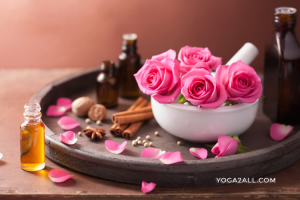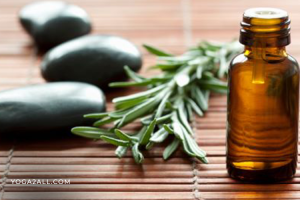
If you are one of the one in three people who suffer from at least mild insomnia, you know how debilitating a chronic sleep deficiency can be. Ongoing sleep deprivation can lead to fatigue, clumsiness, and even weight gain – and can significantly impair cognitive function. It’s even been tied to an increased risk of cardiovascular disease and type 2 diabetes.
Chances are, though, if you struggle with regular insomnia, you already know what the symptoms are – but you need help fixing it. There are pharmacological solutions, like sleeping pills, that can help you get your eight hours rest each night, but they often come with unpleasant side effects – and may even lead to a dependency.
However, there are more natural solutions. Aromatherapy is a great alternative treatment for sleep problems, but the trick is finding the right essential oils for insomnia.

Lavender
Plenty of studies has proven this oil’s effectiveness at promoting healthy sleep – even among hospitalized patients. The smell is soothing and mild and is a great addition to any calming bedtime routine. Use it in an aromatherapy diffuser in your room, or put a few drops on your pillow to let the scent of lavender lull you to sleep.

Chamomile
This oil is recognized by the medical community as a mild tranquilizer, so it’s no wonder that it’s a regular go-to aromatherapy option for inducing sleep. The sedative effect of this oil is thought to be due to a particular flavonoid within chamomile that activates the benzodiazepine receptors in your brain – making this option nearly as effective as taking a pharmaceutical sleep aid.
In addition to its uses as an aromatherapy oil, you can also make yourself a warm cup of chamomile tea about a half hour before bed. Chamomile will not only help you sleep better and longer, but has also shown to be effective against symptoms of anxiety and depression.

Marjoram
The effect of marjoram on insomnia is even more pronounced than both chamomile and lavender, and it is frequently used to help reduce sleep issues with aromatherapy. Specifically, it helps resolve problems that can impact the quality of your rest, like snoring and sleep apnea. Take a big whiff of this aroma prior to going to sleep, and leave the jar open on your nightstand to help keep your airways open and promote a deep, restful sleep.

Vetiver
This is a stronger-smelling oil but does wonders to help calm the mind. Vetiver oil actually works by addressing some of the symptoms that can lead to insomnia, like anxiety and stress. A deeply grounding oil, vetiver boasts naturally tranquilizing properties and makes a great massage oil.
Using a carrier oil like jojoba or coconut oil, rub vetiver oil into your skin before climbing into bed. Not only will your muscles be relaxed, your mind will be, too.

Ylang Ylang
With a softly sweet and deliciously floral perfume, ylang ylang oil promotes a deep, restorative sleep. This oil generates a feeling of peace and relaxation that helps to induce drowsiness and leaves you feeling revitalized after a good night’s rest. Ylang ylang also helps lower blood pressure.
This oil is great for your skin, so blend it with a carrier oil and apply ylang-ylang topically to rejuvenate your skin while you rest. You’ll wake up with glowing skin and a positive outlook.

Cedarwood
Using this oil can actually stimulate the gland that produces melatonin, which is what signals to your body that it’s time to go to sleep. Cedarwood oil also works to relieve headaches and loosen phlegm, both of which can promote a more restful sleep.
To improve the quality of your sleep, try using a carrier oil to massage a few drops of cedarwood oil into your feet. The calming effect will help induce a deep, healthy sleep, allowing your body the time it needs to heal and repair tissue and cells.
When you’re ready to start purchasing oils to use aromatherapy for insomnia, remember to purchase pure oils that are labeled therapeutic grade. These will provide the greatest benefit. If you’re still unable to get a good night’s sleep even with these aromatherapy oils, you may need to consider other options. Talk about other potential natural treatments with your healthcare professional. We hope this has been an informative article on sleep problems and aromatherapy.
———————————————————————————–
This article is written by Nina Wells from Steam Shower Store. She has over 10 years’ experience in writing health-related topics and specializes in the health benefits of saunas and hydrotherapy.
———————————————————————————–








Saved as a favorite, I love your blog!
Thanks